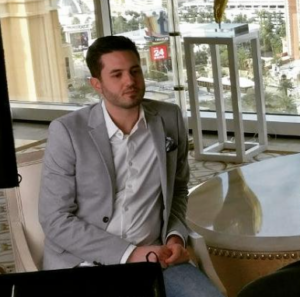Why is This Trending on X? Chris Pavlovski’s Controversal Tweet
#Trending #Chris #Pavlovskis #Controversal #Tweet
Welcome to Allsocial Updates . Get latest News related to entertainment, Education, Technology, Sports, Science , Finance at one place. Please Subscribe to our feed and Bookmark our website for all updates around the world
The #BoycottDunkinDonuts trend is more than just a fleeting social media phenomenon; it is a reflection of the deep-seated divisions within American society
As corporations find themselves increasingly drawn into the culture wars, they must navigate these turbulent waters carefully, balancing the demands of diverse customer bases with the need to uphold their brand values.
However, the broader implications of this trend are clear: in the digital age, the lines between politics, culture, and commerce are increasingly blurred, and companies must be prepared to respond to the ever-changing landscape of public opinion.
The controversy involving Rumble, Dunkin’ Donuts, and Diageo is a stark reminder of the complex and often contentious relationship between social media platforms and advertisers.
As brands become more discerning about where their advertisements appear, platforms will need to adapt to meet the changing demands of both advertisers and users.
Whether this controversy marks a turning point for Rumble and its advertising strategy remains to be seen, but it is clear that the decisions made in the coming months will have a significant impact on the platform’s future.


Also Read: Twitch Streamer JoshOG Shares Devastating News About His Mother, Career and Controversy
Chris Pavlovski’s Controversal Tweet
Introduction: The Hashtag Frenzy and Corporate Politics
In the modern age of social media, a single tweet can ignite a firestorm of controversy, leading to widespread debates, boycotts, and even significant impacts on large corporations.
Such is the case with the latest trend on X (formerly Twitter), where the hashtag #BoycottDunkinDonuts has gained traction. The catalyst for this online movement was a tweet from Chris Pavlovski, CEO of Rumble, a social media platform that has gained popularity among conservative commentators.
Pavlovski’s claims about Dunkin Donuts and Diageo, the beverage giant, allegedly pushing Rumble to distance itself from controversial right-wing figure Steven Crowder have sparked a heated debate.
This article will delve into the events leading up to this trend, the reactions it has garnered, and the broader implications of corporate and cultural clashes in the digital age.
Both @Diageo_NA and @dunkindonuts want us to drop @scrowder and get away from “right wing culture” in order to get ad dollars from them.
My response: No, we don’t discriminate. All cultures are welcome on Rumble.
— Chris Pavlovski (@chrispavlovski) August 7, 2024
The Genesis
On August 8, 2024, Chris Pavlovski set the stage for a social media storm with a tweet that alleged Dunkin Donuts and Diageo North America pressured Rumble to drop Steven Crowder.
Crowder, a conservative commentator known for his provocative views, had moved his political podcast, “Louder With Crowder,” to Rumble after facing multiple controversies on YouTube.
Pavlovski’s tweet claimed that the companies wanted Rumble to distance itself from what they perceived as “right-wing culture” in exchange for advertising revenue.
Pavlovski’s response to this alleged demand was a firm refusal. He tweeted, “My response: No, we don’t discriminate. All cultures are welcome on Rumble.” This statement not only defended his platform’s stance on free speech but also positioned Rumble as a champion of diverse viewpoints, regardless of their political leanings.
The Role of Steven Crowder: A Controversial Figure
Steven Crowder has been a polarizing figure in American media. His content, often criticized for its inflammatory nature, has found a home on Rumble after being demonetized on YouTube.
Crowder’s move to Rumble was seen by many as a victory for conservative voices who felt silenced by more mainstream platforms. However, this move also made Rumble a target for scrutiny by advertisers and corporations concerned about brand safety.
Crowder’s presence on Rumble has been both a boon and a bane for the platform. While it has attracted a loyal audience of right-wing viewers, it has also deterred potential advertisers wary of associating their brands with his content.
The alleged demand by Dunkin Donuts and Diageo to drop Crowder underscores the ongoing tension between free speech and corporate interests in the digital age.


Chris Pavlovski: Hashtag #BoycottDunkinDonuts Trends
Pavlovski’s tweet quickly resonated with conservatives and supporters of the MAGA (Make America Great Again) movement, who viewed the alleged demand as an attack on their values.
The hashtag #BoycottDunkinDonuts began trending on X, with users drawing parallels to the 2023 Bud Light boycott, another example of conservative backlash against a brand perceived as “woke.”
The call for a boycott of Dunkin Donuts echoed previous campaigns where conservatives have used their purchasing power to punish companies they believe are pandering to progressive causes.
The Bud Light boycott, sparked by the brand’s partnership with a transgender influencer, resulted in a significant drop in sales and became a rallying cry for those opposed to “woke” corporate practices. Now, similar demands were being made for Dunkin Donuts to face the same fate.
The MAGA Reaction: Rallying Against “Woke” Corporations
Prominent conservative figures, including Rep. Marjorie Taylor Greene, quickly joined the boycott campaign.
Greene labeled Dunkin Donuts as “woke,” a term increasingly used by conservatives to describe companies or individuals who are perceived to be excessively progressive or politically correct.
The boycott movement gained momentum as more right-wing influencers and media personalities amplified the message.
The MAGA movement, which has often positioned itself as a defender of traditional American values, viewed this boycott as another battle in the culture war.
For many of its supporters, boycotting Dunkin Donuts was a way to push back against what they see as the growing influence of progressive ideologies in corporate America. The hashtag became a symbol of resistance against perceived cultural and political overreach by corporations.
The Counter-Movement: Defending Dunkin Donuts
As with any online controversy, the backlash against Dunkin Donuts also sparked a counter-movement. Many users on X expressed their support for the coffee chain and criticized the MAGA crowd for engaging in what they saw as hypocritical cancel culture.
These users argued that corporations have the right to choose where they advertise and that the MAGA boycott was an overreaction.
Some of the counter-movement’s arguments centered around the idea of free market principles. They pointed out that just as Rumble had the right to host Steven Crowder, Dunkin Donuts had the right to decide where to allocate its advertising dollars.
This perspective framed the boycott as an attempt to bully a corporation into aligning with a specific political viewpoint, which they saw as antithetical to conservative values of free enterprise and limited government intervention.
The Cultural Clash: A Divided America
The #BoycottDunkinDonuts trend is indicative of a deeper cultural and political divide in America. On one side are those who feel that conservative voices are increasingly marginalized by mainstream media and corporate interests.
On the other are those who believe that companies have the right to make business decisions without being coerced by political movements.
This divide is not new, but social media has amplified it, allowing both sides to mobilize quickly and effectively.
Hashtags like #BoycottDunkinDonuts become battle cries in a larger cultural war, where every corporate decision is scrutinized for its political implications. The rapid spread of these movements reflects the power of social media to shape public discourse and influence corporate behavior.


Also Read: Jose Mourinho Aims for Fenerbahce to Sign Barcelona Star, Transfer News and More
Chris Pavlovski: Controversy Surrounding Rumble and Advertisers
In the ever-evolving landscape of social media platforms and content sharing sites, controversies are not uncommon.
Recently, Rumble, a platform that has often been labeled as a right-leaning alternative to YouTube, found itself at the center of a significant controversy.
The CEO of Rumble, Chris Pavlovski, made headlines by sharing screenshots of alleged emails from Dunkin’ Donuts and Diageo, two major brands that had apparently expressed concerns about advertising on the platform.
The Alleged Emails: A Glimpse into Brand Concerns
The controversy began when Pavlovski took to social media to share what he claimed were emails from representatives of Dunkin’ Donuts and Diageo.
According to Pavlovski, these emails contained clear indications that the companies were considering pulling their advertisements from Rumble due to concerns over the platform’s content and audience.
In the case of Dunkin’ Donuts, the alleged email reportedly stated, “I would be opposed to showing up on the current version of the platform — the right wing culture of the site is too polarizing from a brand suitability standpoint today.”


This statement suggests that Dunkin’ Donuts, a brand with a wide and diverse customer base, was concerned about the potential backlash or negative associations that could arise from being linked to a platform perceived as catering to a specific political ideology.
Similarly, the email allegedly from Diageo, a global leader in alcoholic beverages, expressed even stronger reservations. The Diageo spokesperson reportedly wrote, “There is no scenario where we approve a platform that has Steven Crowder, Alex Jones, or the like.”
This statement highlights Diageo’s firm stance against associating its brand with controversial figures who have been known for their polarizing content.
The Implications of Brand Suitability
The term “brand suitability” has gained significant traction in recent years, particularly as companies become more aware of the potential risks associated with where their advertisements appear.
In an age where consumers are increasingly vocal about the values and ethics of the brands they support, companies are taking proactive steps to ensure that their advertisements align with their brand image and values.
For Dunkin’ Donuts and Diageo, the decision to distance themselves from Rumble appears to be rooted in concerns about brand suitability.
By associating their advertisements with a platform that hosts content from controversial figures, these brands risk alienating a portion of their customer base or, worse, becoming embroiled in the controversies themselves.
The alleged emails from Dunkin’ Donuts and Diageo suggest that these brands are keenly aware of the potential consequences and are taking steps to mitigate any potential damage to their reputation.


Chris Pavlovski: Impact of Public Perception on Advertising Decisions
Public perception plays a crucial role in shaping the decisions of advertisers.
In today’s digital age, where social media can amplify both positive and negative feedback, brands are more vulnerable than ever to the opinions of their customers.
A single advertisement placed in the wrong context can lead to a backlash that spreads rapidly across social media, potentially causing long-term damage to a brand’s reputation.
The alleged emails from Dunkin’ Donuts and Diageo reflect a growing awareness among brands of the power of public perception. By distancing themselves from Rumble, these brands are not only protecting their image but also signaling to their customers that they are attuned to their concerns.
In an era where consumers are increasingly aligning their purchasing decisions with their values, brands must be mindful of how their advertising choices are perceived by the public.
The Broader Implications for Social Media Platforms
- The controversy involving Rumble, Dunkin’ Donuts, and Diageo is indicative of a broader trend in the digital advertising landscape.
- As social media platforms continue to proliferate and diversify, brands are faced with the challenge of navigating an increasingly complex advertising environment.
- The decisions made by Dunkin’ Donuts and Diageo to withdraw their advertisements from Rumble could set a precedent for other brands to follow, particularly those that are concerned about the potential risks associated with advertising on platforms that host controversial content.
- For social media platforms, this trend presents both challenges and opportunities.
- On one hand, platforms like Rumble may struggle to attract mainstream advertisers if they are perceived as catering to a niche or polarizing audience.
- On the other hand, there is an opportunity for these platforms to carve out a unique identity and attract advertisers who are looking to reach specific demographics that may be underserved by mainstream platforms.
The Response from Rumble’s Audience
The reaction from Rumble’s audience to the controversy has been mixed.
Some users have praised the platform for standing firm in its commitment to free speech, while others have expressed concern about the potential impact on the platform’s sustainability if major advertisers continue to pull out.
For Rumble, maintaining the support of its user base will be crucial as it navigates the challenges ahead.
The platform’s response to the controversy will also be closely watched by other social media platforms that may face similar challenges in the future.
As the digital advertising landscape continues to evolve, the decisions made by Rumble and its advertisers could have far-reaching implications for the industry as a whole.
Also Read: New York Phil Maton Trade News: Team Reportedly Acquires Outfielder Jesse Winker
